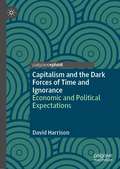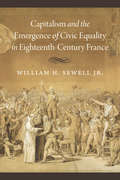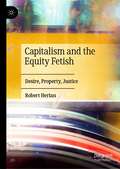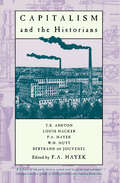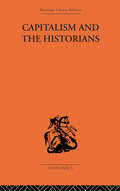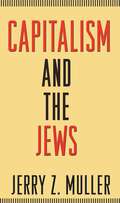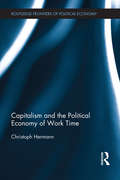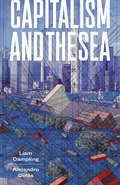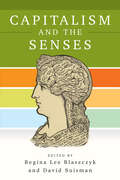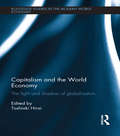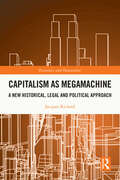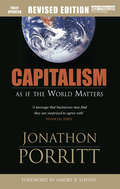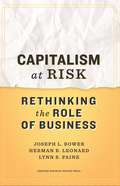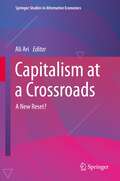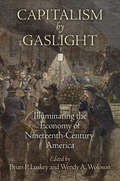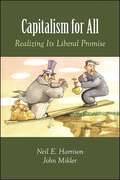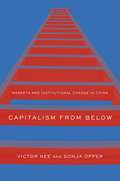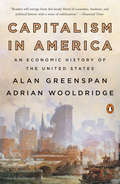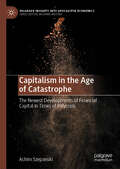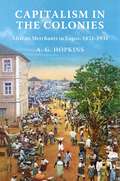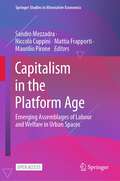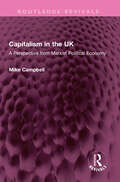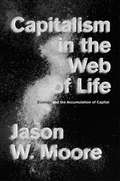- Table View
- List View
Capitalism and the Dark Forces of Time and Ignorance: Economic and Political Expectations
by David HarrisonThis book explores the role of expectations within the modern capitalist system. Through looking at how they are formed and develop, the impact of events that lead to a collapse in expectations, such as a major financial crisis, is examined to highlight the precarious and unstable nature of the economic system. With a particular focus on the UK and USA, it is also considered how public policy and institutions can shift the balance away from speculation and back towards enterprise. This book aims to conceptualise instability and highlight how economic and regulatory policy can limit it. It will be relevant to researchers and policymakers interested in economic policy and regulatory reform.
Capitalism and the Emergence of Civic Equality in Eighteenth-Century France (The Parker Novels)
by William H. Sewell Jr.There is little doubt that the French Revolution of 1789 changed the course of Western history. But why did the idea of civic equality—a distinctive signature of that revolution—find such fertile ground in France? How might changing economic and social realities have affected political opinions? William H. Sewell Jr. argues that the flourishing of commercial capitalism in eighteenth-century France introduced a new independence, flexibility, and anonymity to French social life. By entering the interstices of this otherwise rigidly hierarchical society, expanded commodity exchange colored everyday experience in ways that made civic equality thinkable, possible, even desirable, when the crisis of the French Revolution arrived. Sewell ties together masterful analyses of a multitude of interrelated topics: the rise of commerce, the emergence of urban publics, the careers of the philosophes, commercial publishing, patronage, political economy, trade, and state finance. Capitalism and the Emergence of Civic Equality in Eighteenth-Century France offers an original interpretation of one of history’s pivotal moments.
Capitalism and the Equity Fetish: Desire, Property, Justice
by Robert HerianThis book is a provocative, interdisciplinary, and critical appraisal of civil justice, property, and the laws that shape and command them within capitalism. Dr. Herian’s book is both a complementary and countervailing narrative to many mainstream legal accounts, one that critiques core and influential areas of legal knowledge and practice. Central to the book’s thesis is a rich collaboration of ideas and perspectives that consider what is at stake from institutions, concepts, and practices of equity and civil justice tied to the subjective psychic life and the unconscious desires of capitalist stakeholders. The book aims to address several questions, including how capitalism has imagined and shaped equity and civil justice since the nineteenth century; how capitalism acts as a well-spring of desire for forms of justice that wrap-around and sustain complex frameworks of private property power and ownership; and how equity supports agile neoliberal strategies of justice and reason in the twenty-first century.
Capitalism and the Historians
by Bertrand de Jouvenel T. S. Ashton Louis Hacker W. H. HuttEssays by economic historians making the case that early factory workers benefited from the Industrial Revolution, despite its hardships and disruptions. The views generally held about the rise of the factory system in Britain derive from highly distorted accounts of the social consequences of that system—so say the distinguished economic historians whose papers make up this book. The authors offer documentary evidence to support their conclusion that under capitalism the workers, despite long hours and other hardships of factory life, were better off financially, had more opportunities, and led a better life than had been the case before the Industrial Revolution. Edited and with an introduction by the Nobel Prize-winning economist and author of The Road to Serfdom, this is &“a book that will disturb the sleep of a good many scholars&” (Max Eastman).
Capitalism and the Historians
by F. A. HayekA book that will disturb the sleep of a good many scholars" Max Eastman F. A. Hayek's Introduction lays the groundwork for this study of the rise of the factory system in Great Britain. It also examines why historians have been so critical of capitalism and the factory system. The subsequent essays discuss why intellectuals have usually been antagonistic to capitalism and what effect these historical misconceptions have had on the world's attitude toward business enterprise. * Papers by distinguished British, American and European economic historians including T. S. Ashton, L. M. Hacker and Bertrand de Jouvenel * Actual case studies of the English factory system and the English factory worker support the theoretical material.
Capitalism and the Jews
by Jerry Z. MullerHow the fate of the Jews has been shaped by the development of capitalismThe unique historical relationship between capitalism and the Jews is crucial to understanding modern European and Jewish history. But the subject has been addressed less often by mainstream historians than by anti-Semites or apologists. In this book Jerry Muller, a leading historian of capitalism, separates myth from reality to explain why the Jewish experience with capitalism has been so important and complex—and so ambivalent.Drawing on economic, social, political, and intellectual history from medieval Europe through contemporary America and Israel, Capitalism and the Jews examines the ways in which thinking about capitalism and thinking about the Jews have gone hand in hand in European thought, and why anticapitalism and anti-Semitism have frequently been linked. The book explains why Jews have tended to be disproportionately successful in capitalist societies, but also why Jews have numbered among the fiercest anticapitalists and Communists. The book shows how the ancient idea that money was unproductive led from the stigmatization of usury and the Jews to the stigmatization of finance and, ultimately, in Marxism, the stigmatization of capitalism itself. Finally, the book traces how the traditional status of the Jews as a diasporic merchant minority both encouraged their economic success and made them particularly vulnerable to the ethnic nationalism of the nineteenth and twentieth centuries.Providing a fresh look at an important but frequently misunderstood subject, Capitalism and the Jews will interest anyone who wants to understand the Jewish role in the development of capitalism, the role of capitalism in the modern fate of the Jews, or the ways in which the story of capitalism and the Jews has affected the history of Europe and beyond, from the medieval period to our own.
Capitalism and the Party-State: The People's Republic of China at 70
by Meg Rithmire Courtney HanIn 2019, the People's Republic of China (PRC) turned seventy-years-old and became the longest active authoritarian regime in recent history. By then, China was the world's second largest economy by GDP (after the United States), and a high-technology industrial powerhouse, with ambitions to bring connectivity infrastructure to developing nations. By the time China's fifth generation leader Xi Jinping took office in 2012, the Chinese Communist Party had presided over decades of unprecedented economic growth while maintaining a monopoly on political power. By 2021, Xi showed no signs of choosing a successor or stepping down after the customary two five-year terms. Despite promising more and deeper market reforms, the PRC at 70 appeared to oversee an increasingly complex economy and society with a party-state expanding its presence into nearly every aspect of civilian life. The world sought to make sense of China's changes and especially the apparent resurgence of the party-state. What would China's conservative turn mean for its future and its role in the world?
Capitalism and the Political Economy of Work Time (Routledge Frontiers of Political Economy)
by Christoph HermannJohn Maynard Keynes expected that around the year 2030 people would only work 15 hours a week. In the mid-1960s, Jean Fourastié still anticipated the introduction of the 30-hour week in the year 2000, when productivity would continue to grow at an established pace. Productivity growth slowed down somewhat in the 1970s and 1980s, but rebounded in the 1990s with the spread of new information and communication technologies. The knowledge economy, however, did not bring about a jobless future or a world without work, as some scholars had predicted. With few exceptions, work hours of full-time employees have hardly fallen in the advanced capitalist countries in the last three decades, while in a number of countries they have actually increased since the 1980s. This book takes the persistence of long work hours as starting point to investigate the relationship between capitalism and work time. It does so by discussing major theoretical schools and their explanations for the length and distribution of work hours, as well as tracing major changes in production and reproduction systems, and analyzing their consequences for work hours. Furthermore, this volume explores the struggle for shorter work hours, starting from the introduction of the ten-hour work day in the nineteenth century to the introduction of the 35-hour week in France and Germany at the end of the twentieth century. However, the book also shows how neoliberalism has eroded collective work time regulations and resulted in an increase and polarization of work hours since the 1980s. Finally, the book argues that shorter work hours not only means more free time for workers, but also reduces inequality and improves human and ecological sustainability.
Capitalism and the Sea: The Maritime Factor in the Making of the Modern World
by Alejandro Colas Liam CamplingWhat keeps capitalism afloat?The global ocean has through the centuries served as a trade route, strategic space, fish bank and supply chain for the modern capitalist economy. While sea beds are drilled for their fossil fuels and minerals, and coastlines developed for real estate and leisure, the oceans continue to absorb the toxic discharges of our carbon civilization - warming, expanding, and acidifying the blue water part of the planet in ways that will bring unpredictable but irreversible consequences for the rest of the biosphere.In this bold and radical new book, Campling and Colás analyze these and other sea-related phenomena through a historical and geographical lens. In successive chapters dealing with the political economy, ecology and geopolitics of the sea, the authors argue that the earth's geographical separation into land and sea has significant consequences for capitalist development. The distinctive features of this mode of production continuously seek to transcend the land-sea binary in an incessant quest for profit, engendering new alignments of sovereignty, exploitation and appropriation in the capture and coding of maritime spaces and resources.
Capitalism and the Senses (Hagley Perspectives on Business and Culture)
by Regina Lee Blaszczyk and David SuismanCapitalism and the Senses is the first edited volume to explore how the forces of capitalism are entangled with everyday sensory experience. If the senses have a history, as Karl Marx wrote, then that history is inseparable from the development of capitalism, which has both taken advantage of the senses and influenced how sensory experience has changed over time.This pioneering collection shows how seeing, hearing, tasting, smelling, and touching have both shaped and been shaped by commercial interests from the turn of the twentieth century to our own time. From the manipulation of taste and texture in the food industry to the careful engineering of the feel of artificial fabrics, capitalist enterprises have worked to commodify the senses in a wide variety of ways. Drawing on history, anthropology, geography, and other fields, the volume’s essays analyze not only where this effort has succeeded but also where the senses have resisted control and the logic of markets. The result is an innovative ensemble that demonstrates how the drive to exploit sensorial experience for profit became a defining feature of capitalist modernity and establishes the senses as an important dimension of the history of capitalism.Contributors: Nicholas Anderman, Regina Lee Blaszczyk, Jessica P. Clark, Ai Hisano, Lisa Jacobson, Sven Kube, Grace Lees-Maffei, Ingemar Pettersson, David Suisman, Ana María Ulloa, Nicole Welk-Joerger.
Capitalism and the World Economy: The Light and Shadow of Globalization (Routledge Studies in the Modern World Economy)
by Toshiaki HiraiGlobalization is a phenomenon which has attracted much attention in the past, but there are still many questions that remain unanswered. This book categorizes globalization into three types: Financial Globalization, the collapse of the Cold War order and the ensuing convergence toward the capitalistic system; and the rise of the emerging nations. The globalization of capitalism has two implications. One is trust in the market economy system and support for a minimal state while another is an aspect of the Casino Capitalism as typically seen by the rampant emergence of hedge funds. This book explores both the light and shadows cast by globalization, endeavoring to identify both positive and problematic effects of the globalization process on the world economy. For this purpose we would first examine the nature and the feature of the world capitalism in relation to globalization. Then we would discuss and investigate the path along which important nations - first the developed nations (the USA, EU and Japan), followed by the emerging nations (BRICs) - have proceeded under the influence of globalization. Focusing on this phenomenon from diverse points of view, which is to be taken by the first-rank contributors in their fields, will be extraordinarily fruitful for understanding not only the world capitalism. This collection, from a selection of leading international contributors, will not only shed light on world capitalism as it is now, but will also offer pointers as to its future directions.
Capitalism as Megamachine: A New Historical, Legal and Political Approach (Economics and Humanities)
by Jacques RichardThe concept of a “megamachine” – a closed system operating to a pre-established utilitarian purpose which results in the machinisation of humanity – has existed in various forms since at least the late 19th century.This book builds on previous attempts to define and analyse the machine and argues that modern industrial capitalism is at the heart of it. The first part of the book takes stock of previous attempts to explain the origin and nature of the Megamachine phenomenon, from Nietzsche to the 21st century, including Mumford, Latouche and Scheidler. The second part of the book proposes a new analysis of the nature of the Megamachine, beginning with a historical, sociological and political exploration of the development of modern capitalism from the Middle Ages to the present day. It is shown that the modern world is under the yoke of accounting and corporate laws which ratify, on an international scale, the systematic protection of financial capital to the detriment of natural and human capitals: a Megamachine of accountants and managers. Defeating the machine will require more than minor reforms such as carbon pricing and integrated reporting: it will be necessary to initiate a programme of cooperation, education and economic policy reorientation on a global scale.This vital book on the crisis of capitalism, the concept of the Megamachine and the future of global society will be of great interest to readers across the social sciences and humanities.
Capitalism as if the World Matters
by Jonathon PorrittWhen first published, Capitalism as if the World Matters, by one of the leading 'eco-warriors' of our time, shocked a generation of both environmentalists and business people. Jonathon Porritt brushed aside their artificial battle lines with a powerful argument that the only way to save the world from environmental catastrophe is to embrace a new type of capitalism, and to do it quickly. In this substantially revised and updated edition, Porritt extends his powerful and controversial argument by providing fresh evidence and suggesting new actions. New content includes in-depth coverage of the USA, with case studies examining the role of huge American corporations such as Wal-Mart and General Electric, plus a close look at China and the global impact this economic giant may have in the twenty-first century. This is a must-read for everyone who has a stake in the future of the world, from business executives to environmental activists, from community leaders to the politicians with their hands on the levers of power. Published with Forum for the Future
Capitalism at Risk
by Herman B. Leonard Lynn S. Paine Joseph L. BowerThe spread of capitalism worldwide has made people wealthier than ever before. But capitalism's future is far from assured. The global financial meltdown of 2008 nearly produced a great depression. Economies in Europe are still teetering. Income inequality, resource depletion, mass migrations from poor to rich countries, religious fundamentalism-these are just a few of the threats to continuing prosperity. How can capitalism be sustained? And who should spearhead the effort? Critics turn to government. In Capitalism at Risk, Harvard Business School professors Joseph Bower, Herman Leonard, and Lynn Paine argue that while governments must play a role, businesses should take the lead. For enterprising companies-whether large multinationals, established regional players, or small start-ups-the current threats to market capitalism present important opportunities.Capitalism at Risk draws on discussions with business leaders around the world to identify ten potential disruptors of the global market system. Presenting examples of companies already making a difference, the authors explain how business must serve both as innovator and activist-developing corporate strategies that effect change at the community, national, and international levels.Filled with rich insights, Capitalism at Risk presents a compelling and constructive vision for the future of market capitalism.
Capitalism at a Crossroads: A New Reset? (Springer Studies in Alternative Economics)
by Ali AriAs the current capitalist system has been increasingly struggling to respond to the problems and uncertainties in the global economy, this book aims to identify the main economic, social, and ecological problems and discusses solutions for a more inclusive and sustainable economic system. Written by an international selection of contributors, it takes a wider perspective beyond classical orthodox economics. By doing so, this book covers a wide range of topics, such as global warming and climate change, food and energy scarcity, rising inequality and debt issues, health, ecological, economic, and political crises, degrowth, green new deals, solidarity, economy, artificial intelligence, technological change, smart solutions, and smart cities. Discussing these topics, the book presents answers to the question of whether the current capitalist system is viable and provides suggestions for a fair, inclusive, and modern economic system. Taking a comprehensive approach, the book will appeal to students, scholars, and researchers of heterodox and alternative economics.
Capitalism by Gaslight
by Wendy A. Woloson Brian P. LuskeyWhile elite merchants, financiers, shopkeepers, and customers were the most visible producers, consumers, and distributors of goods and capital in the nineteenth century, they were certainly not alone in shaping the economy. Lurking in the shadows of capitalism's past are those who made markets by navigating a range of new financial instruments, information systems, and modes of transactions: prostitutes, dealers in used goods, mock auctioneers, illegal slavers, traffickers in stolen horses, emigrant runners, pilfering dock workers, and other ordinary people who, through their transactions and lives, helped to make capitalism as much as it made them.Capitalism by Gaslight illuminates American economic history by emphasizing the significance of these markets and the cultural debates they provoked. These essays reveal that the rules of economic engagement were still being established in the nineteenth century: delineations between legal and illegal, moral and immoral, acceptable and unsuitable were far from clear. The contributors examine the fluid mobility and unstable value of people and goods, the shifting geographies and structures of commercial institutions, the blurred boundaries between legitimate and illegitimate economic activity, and the daily lives of men and women who participated creatively--and often subversively--in American commerce.With subjects ranging from women's studies and African American history to material and consumer culture, this compelling volume illustrates that when hidden forms of commerce are brought to light, they can become flashpoints revealing the tensions, fissures, and inequities inherent in capitalism itself.Contributors: Paul Erickson, Robert J. Gamble, Ellen Gruber Garvey, Corey Goettsch, Joshua R. Greenberg, Katie M. Hemphill, Craig B. Hollander, Brian P. Luskey, Will B. Mackintosh, Adam Mendelsohn, Brendan P. O'Malley, Michael D. Thompson, Wendy A. Woloson.
Capitalism for All: Realizing Its Liberal Promise
by John Mikler Neil E. HarrisonCapitalism has lost its glamor. In just three decades since it "defeated" a totalitarian Soviet Union, capitalism is today blamed for slowing growth, a dangerously changing climate, inequality, social misery, and a rise in nationalist populism. How did capitalism fall so far from grace? Capitalism for All show how, quite simply, the governments of the world’s wealthiest countries have forgotten capitalism’s initial purpose. It was born out of a liberal philosophy that values the competition of ideas and goods in the service of social progress while respecting the individual and preventing excessive power. Yet, with the aid of governments, giant corporations, or "MegaCorps," have usurped power, dominated markets, and reduced competition. The result is not liberal capitalism but what Neil E. Harrison and John Mikler term "CorpoCapitalism," which results in an unhappy populace seeking radical political change while challenges like climate change continue to race forward largely unchecked. Capitalism for All explores how CorpoCapitalism came to be, argues that it is not inevitable, and explains how governments can wrest back power and create a capitalism for all.
Capitalism from Below
by Victor Nee Sonja OpperMore than 630 million Chinese have escaped poverty since the 1980s, reducing the fraction remaining from 82 to 10 percent of the population. This astonishing decline in poverty, the largest in history, coincided with the rapid growth of a private enterprise economy. Yet private enterprise in China emerged in spite of impediments set up by the Chinese government. How did private enterprise overcome these initial obstacles to become the engine of Chinas economic miracle? Where did capitalism come from? Studying over 700 manufacturing firms in the Yangzi region, Victor Nee and Sonja Opper argue that Chinas private enterprise economy bubbled up from below. Through trial and error, entrepreneurs devised institutional innovations that enabled them to decouple from the established economic order to start up and grow small, private manufacturing firms. Barriers to entry motivated them to build their own networks of suppliers and distributors, and to develop competitive advantage in self-organized industrial clusters. Close-knit groups of like-minded people participated in the emergence of private enterprise by offering financing and establishing reliable business norms. This rapidly growing private enterprise economy diffused throughout the coastal regions of China and, passing through a series of tipping points, eroded the market share of state-owned firms. Only after this fledgling economy emerged as a dynamic engine of economic growth, wealth creation, and manufacturing jobs did the political elite legitimize it as a way to jump-start Chinas market society. Today, this private enterprise economy is one of the greatest success stories in the history of capitalism.
Capitalism from Below: Markets And Institutional Change In China
by Victor Nee Sonja OpperOver 630 million Chinese escaped poverty since the 1980s, the largest decrease in poverty in history. Studying 700 manufacturing firms in the Yangzi region, the authors argue that the engine of China’s economic miracle—private enterprise—did not originate at the top but bubbled up from below, overcoming initial obstacles set up by the government.
Capitalism in America: A History
by Adrian Wooldridge Alan GreenspanFrom the legendary former Fed Chairman and the acclaimed Economist writer and historian, the full, epic story of America's evolution from a small patchwork of threadbare colonies to the most powerful engine of wealth and innovation the world has ever seen.Shortlisted for the 2018 Financial Times and McKinsey Business Book of the Year AwardFrom even the start of his fabled career, Alan Greenspan was duly famous for his deep understanding of even the most arcane corners of the American economy, and his restless curiosity to know even more. To the extent possible, he has made a science of understanding how the US economy works almost as a living organism--how it grows and changes, surges and stalls. He has made a particular study of the question of productivity growth, at the heart of which is the riddle of innovation. Where does innovation come from, and how does it spread through a society? And why do some eras see the fruits of innovation spread more democratically, and others, including our own, see the opposite?In Capitalism in America, Greenspan distills a lifetime of grappling with these questions into a thrilling and profound master reckoning with the decisive drivers of the US economy over the course of its history. In partnership with the celebrated Economist journalist and historian Adrian Wooldridge, he unfolds a tale involving vast landscapes, titanic figures, triumphant breakthroughs, enlightenment ideals as well as terrible moral failings. Every crucial debate is here--from the role of slavery in the antebellum Southern economy to the real impact of FDR's New Deal to America's violent mood swings in its openness to global trade and its impact. But to read Capitalism in America is above all to be stirred deeply by the extraordinary productive energies unleashed by millions of ordinary Americans that have driven this country to unprecedented heights of power and prosperity. At heart, the authors argue, America's genius has been its unique tolerance for the effects of creative destruction, the ceaseless churn of the old giving way to the new, driven by new people and new ideas. Often messy and painful, creative destruction has also lifted almost all Americans to standards of living unimaginable to even the wealthiest citizens of the world a few generations past. A sense of justice and human decency demands that those who bear the brunt of the pain of change be protected, but America has always accepted more pain for more gain, and its vaunted rise cannot otherwise be understood, or its challenges faced, without recognizing this legacy. For now, in our time, productivity growth has stalled again, stirring up the populist furies. There's no better moment to apply the lessons of history to the most pressing question we face, that of whether the United States will preserve its preeminence, or see its leadership pass to other, inevitably less democratic powers.
Capitalism in the Age of Catastrophe: The Newest Developments of Financial Capital in Times of Polycrisis (Palgrave Insights into Apocalypse Economics)
by Achim SzepanskiThis book analyses contemporary and future conditions of global finance and capitalism in an age of catastrophe. It illuminates the links between various crises that have beset the world economy in recent decades and sets these in philosophical context, drawing on the work of Marx, Bataille and Baudrillard to forge new understandings of the impact of capitalist hegemony on society and nature. The book introduces the concept of the ‘over’ as a lens through which to reflect on capitalist excess and its negative consequences, such as over-accumulation of goods, over-pollution of the environment, and over-speculation of capital. In particular, it shines a light on the trends of financialization and stagflation, with chapters examining increasingly embedded features of the world economy such as hyper-inflation, the dominance of advanced economy central banks, the phenomenon of repurchase agreements, new asset managers for the ultra-wealthy and index funds to show how capitalist structures continue to drive inequality, ecological breakdown, and geopolitical precarity on a global scale. With a rigorous philosophical and theoretical framework, this book will appeal to political economists, Marxist economists and scholars interested in theories of capitalism.
Capitalism in the Colonies: African Merchants in Lagos, 1851–1931
by A. G. HopkinsAn account that challenges the conventional views of African merchants under colonialism, examining the emergence and changing fortunes of indigenous entrepreneurs in Lagos, NigeriaIn Capitalism in the Colonies, A. G. Hopkins provides the first substantial assessment of the fortunes of African entrepreneurs under colonial rule. Examining the lives and careers of 100 merchants in Lagos, Nigeria, between 1850 and 1931, Hopkins challenges conventional views of the contribution made by indigenous entrepreneurs to the long-run economic development of Nigeria. He argues that African merchants in Lagos not only survived, but were also responsible for key innovations in trade, construction, farming, and finance that are essential for understanding the development of Nigeria&’s economy.The book is based on a large, representative sample and covers a time span that traces mercantile fortunes over two and three generations. Drawing on a wide range of sources, Hopkins shows that indigenous entrepreneurs were far more adventurous than expatriate firms. African merchants in Lagos pioneered motor vehicles, sewing machines, publishing, tanneries, and new types of internal trade. They founded the construction industry that built Lagos into a major port city, moved inland to start the cocoa-farming industry, and developed the finance sector that is still vital to Nigeria&’s economy. They also took the lead in changing single-owned businesses into limited liability companies, creating freehold property rights and promoting wage labour. In short, Hopkins argues, they were the capitalists who introduced the institutions of capitalism into Nigeria. The story of African merchants in Nigeria reminds us, he writes, that economic structures have no life of their own until they are animated by the actions of creative individuals.
Capitalism in the Platform Age: Emerging Assemblages of Labour and Welfare in Urban Spaces (Springer Studies in Alternative Economics)
by Sandro Mezzadra Niccolò Cuppini Mattia Frapporti Maurilio PironeThis open access book provides an overview of urban digital platforms such as Airbnb and Deliveroo, which, along with Amazon, Google, Facebook, and other IT companies, constitute by now the infrastructures for other businesses to operate on and for our social life to go on. These platforms serve as standards-based techno-economic systems that simultaneously capture cooperation through remote coordination and organize labor via algorithm management.Based on a three-years research project, this contributed book outlines a general theory of platform capitalism that conceives these platforms not only as technical devices, but as generative engines that operate at the interface of several aspects, such as digitalization of forms of social cooperation; algorithm-based management of labor and participation; and private and vertical appropriation of profits. These elements are somehow iconic of the capitalist evolution of the last decades, and they open up a reflection on new forms of “primitive accumulation” (in particular regarding data), on the mechanisms used to capture and extract social surplus value, and on the logistic-financial dimensions of capital. Finally, in light of the transformations associated with the COVID-19 pandemic, the authors examine how platforms can evolve into hegemonic organizational structures.Assuming we are all already living in the age of the platform, this book takes a multifaceted approach—combining sociology with urban studies, and political sciences with economics—to grasp the challenges our societies face in terms of ensuring fair economic growth, adequate social protections, and labor rights. It will appeal to anyone interested in digital platforms and how they are changing the organization of labor, urban spaces, and forms of governance.
Capitalism in the UK: A Perspective from Marxist Political Economy (Routledge Revivals)
by Mike CampbellFirst published in 1981, Capitalism in the UK clearly states the Marxist position arguing that capitalism dominates the world economy, and that the world’s trade and multinational enterprises favour the capitalist system. It shows how orthodox economics is not value-free and how orthodox economics implicitly assumes that capitalism is the only possible form of economic organisation for society. Designed for students on Political Economy and Marxists Economics courses, this comprehensive and concise volume provides an important counterweight to traditional first- and second-year introductory textbooks.
Capitalism in the Web of Life: Ecology and the Accumulation of Capital
by Jason W. MooreFinance. Climate. Food. Work. How are the crises of the twenty-first century connected? In Capitalism in the Web of Life, Jason W. Moore argues that the sources of today's global turbulence have a common cause: capitalism as a way of organizing nature, including human nature. Drawing on environmentalist, feminist, and Marxist thought, Moore offers a groundbreaking new synthesis: capitalism as a "world-ecology" of wealth, power, and nature. Capitalism's greatest strength--and the source of its problems--is its capacity to create Cheap Natures: labor, food, energy, and raw materials. That capacity is now in question. Rethinking capitalism through the pulsing and renewing dialectic of humanity-in-nature, Moore takes readers on a journey from the rise of capitalism to the modern mosaic of crisis. Capitalism in the Web of Life shows how the critique of capitalism-in-nature--rather than capitalism and nature--is key to understanding our predicament, and to pursuing the politics of liberation in the century ahead.
